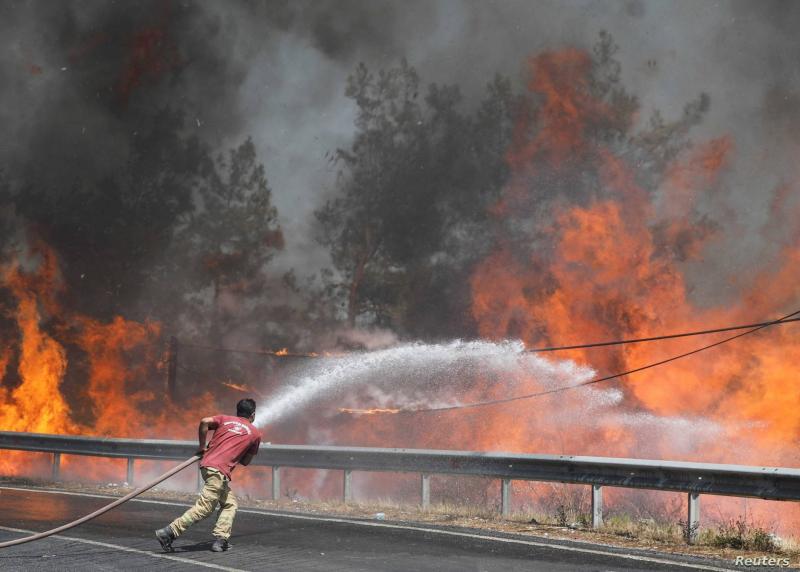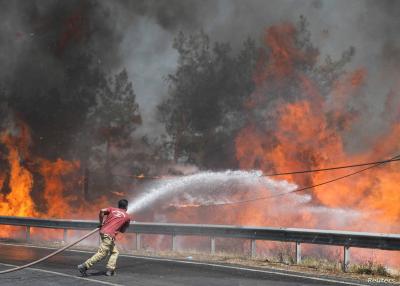Under the title "Experts: Rising Temperatures in Middle Eastern Cities Will Make Them Uninhabitable," the Alhurra site published a translated news article highlighting how many picturesque countries in the Middle East have turned into fiery locales this summer. With extreme temperatures and severe drought sweeping the region, forests burned, and cities became unbearably hot, according to Foreign Policy magazine.
In June, Kuwait recorded a temperature of 53.2 degrees Celsius (127.76 degrees Fahrenheit), while Oman, the UAE, and Saudi Arabia all hit over 50 degrees. A month later, temperatures in Iraq soared to 51.5 degrees, and Iran recorded nearly 51 degrees.
Worse yet, this is just the beginning. The Middle East is warming at twice the global average, and by 2050, it will be 4 degrees Celsius hotter. The World Bank states that harsh climatic conditions will become routine, with the region potentially facing four months of scorching sunlight each year. According to the Max Planck Institute in Germany, many cities in the Middle East may become literally uninhabitable before the end of the century. Furthermore, the region, ravaged by war and steeped in sectarianism, may be uniquely unprepared to confront these challenges that threaten its collective existence.
Greenhouse gas emissions in the region have more than tripled over the past three decades, prompting experts to worry that the sharp rise in temperatures coupled with a lack of basic services makes the area increasingly desperate and dangerous. Gos Lielifeld, a climate expert in the Middle East and Mediterranean at the Max Planck Institute, noted that the Middle East has surpassed the European Union in greenhouse gas emissions, despite being "particularly heavily affected" by climate change. Lielifeld added, "In many Middle Eastern cities, temperatures have risen significantly above 50 degrees Celsius. If nothing changes, cities could face temperatures reaching up to 60 degrees Celsius in the future, which would be deadly for those without access to air conditioning."
### Regional Crises
Air conditioning has become a luxury, even for relatively affluent individuals in countries like Iran, Iraq, Lebanon, Syria, and Yemen. These countries are burdened by war and Western sanctions or ruling elites serving their own interests, witnessing large protests against the lack of basic services amid rising temperatures. In Iraq, record-high heat last month drove people into the streets. They blocked roads, burned tires, and, in anger, surrounded power stations that armed forces were tasked with securing. Ironically, oil-rich Basra in southern Iraq is experiencing the longest power outages and was the center of protests that left at least three Iraqis dead. According to experts, political instability is the main reason behind the electricity crisis in Iraq.
A similar scenario unfolded in Lebanon this month. Lebanese people are already grappling with countless crises and are frustrated with the inaction of the political elite. As fuel supplies dwindled, scenes of chaos emerged across the country. Some people looted fuel tankers, others raided power stations, and some even brought firearms to gas stations to jump ahead of hundreds waiting in line. On August 12, the central bank lifted fuel subsidies, causing generators to fail. Lights went out, and even those living in wealthy neighborhoods—used to air conditioning—had to contend with the extreme heat.
In 2017, Iran recorded the highest official temperature in the region at 54 degrees Celsius and exceeded 50 degrees last month. However, repeated droughts have rendered hydropower plants in the country redundant, further reducing production at a time when demand for electricity is increasing. Protests broke out in various cities in Iran in July, with some demonstrators chanting "death to the dictator" and "death to Khamenei." In Khuzestan province, southwest Iran, people blocked roads and burned tires in protest against water scarcity.
In Syria, waves of drought from 2006 to 2011 deepened the socioeconomic gap between rural and urban areas and are believed to be one of the causes of the Syrian civil war. In Yemen, prolonged war seems to have exacerbated the water crisis. Freshwater sources in Yemen are rapidly drying up, leaving the country parched. Johan Char, a senior fellow at the Stockholm International Peace Research Institute, believes regional cooperation could alleviate the water crisis and reduce carbon emissions in the region. He stated, "The most important aspect of regional cooperation is agreeing on the use and management of shared water resources that will become scarcer and more variable due to severe climatic events, whether rivers or groundwater."




